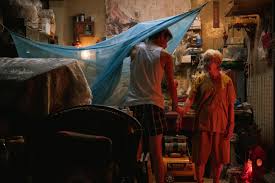

“How to Make Millions Before Grandma Dies is not an autobiographical film, but the characters are definitely based on people close to us. The character of Amah, for example, is very much like my grandmother. She was also sweet, but never able to say that she loved anyone.” – Pat Boonnitipat (film’s director)
How to Make Millions Before Grandma Dies is the debut Thai film of Pat Boonnitipat, that has received international acclaim for its heartfelt storytelling inspired by, as the trailer says, true stories found in every family. This particular story follows M, a college dropout and aspiring video game streamer, who is financially freeloading off of his hardworking mother, Sew. The audience instantly perceives M as indifferent and shallow, who does not genuinely care about family traditions or his family for that matter. When his cousin Mui inherits her grandpa’s house after he passes, M understands that it was because Mui was his caregiver in his last days. Inspired by this, M plots to become the “number one” of Amah, his grandma, who unbeknownst to her has recently been diagnosed with late stage cancer. To her surprise and skepticism, M shows up unannounced at her home to spend time with her, and it’s obvious that he lacks an understanding of who she is. His efforts are clumsy, such as bringing her food she doesn’t even eat and boiling water quickly in the microwave rather than the kettle for the tea she offers to her Gods. Enraged, Amah says “If you do things just to get them done, then don’t do them at all!” and asks him to leave. This sentence to me foreshadowed the future – how M’s careless self-serving actions would eventually transform into intentional considerate actions.
M asks Mui if what he’s doing is wrong, and she advises him that someone’s time is what older people crave the most and that it doesn’t matter what he’s there for. She continues by asking him, “Did you think she smelled funny when you were with her?” to which M replies “Old people just smell.” She says “You notice it because you don’t spend enough time with her. You’ll know you have when you stop noticing.” Convinced by Mui’s words, M decides to move into Amah’s house to take care of her to win her favour, and subsequently reveals to her about her cancer diagnosis. What follows is the budding connection between M and Amah, a relationship that begins steeped in M’s self-interest but gradually transitions into mutual understanding through shared time and intimate moments. The line between M’s selfish motives and genuine care begins to blur as the two navigate their days together. Despite this though, I often found myself questioning M’s actions, wondering if they came from a place of sincerity or calculation. But the moment that stood out to me, when I started to believe M might truly have Amah’s best interests at heart, was during their visit to the temple with her eldest son Kiang and his family. While filling out wishes for the temple lottery, Kiang’s family prayed for their own well-being, Amah prayed for the well-being of her entire family and her health, while M prayed for Amah to win the lottery (and thus her wishes to come true).
The underlying question of the film – who will inherit Amah’s house and therefore is her “number one” – is a red herring. I never thought that Amah had a favourite, and what really struck me most was her unconditional love for her family, despite each members’ agenda. For me, it was not about who Amah gave her house to, but how deeply and selflessly she cared for her family. Her love for her eldest son, Kiang, is evident in the way she makes excuses for his shortcomings, wears the too-small sandals he bought for her, and initially considers moving to his home despite knowing his ulterior motives. For her daughter, Sew, Amah’s love is shown in quieter, more practical ways: urging her to rest after night shifts, reminding her not to keep expired food, and sharing a tender confession that “If there’s someone I want most to stay with, it’s you.” Even for her wayward youngest son Soei who rarely shows her care and steals from her, Amah helps him settle debts and admits that it’s good when she doesn’t see him coming to her house because that means he is doing well (and not in need of money). And then there’s M. Her love for him is present in small gestures: saving pomegranates for him since his childhood even though he’s long forgotten asking her to, silently tolerating his selfish deeds, and even apologizing for moments of frustration when she called him an idiot. In the end, while Amah does make a decision about her house, it feels incidental to the true message of the film. Through partly her words but mostly her actions, Amah’s care becomes the underlying heart of the story, showing how unconditional love can sometimes go unacknowledged but is never truly absent, even after someone is gone. The film is a lesson for all of us to value the people in our life, and that we risk losing something irreplaceable if we’re not present for them, fully and authentically, when we still can.
Some parts of the film might be culturally specific, but what I found beautiful was that it is still universally understood. I watched it in the Netherlands, which is arguably different in many ways to Thailand, yet we all chuckled lightly when queuing for the hospital already began before 8am where shoes were placed to reserve a spot in line instead of the person, and we all welled up when M asked Amah if she ever gets lonely, to which she responded that she wouldn’t call it loneliness and it is a part of life’s process, but she has a problem with the day after Chinese New Year when all the leftovers from the night before are in the fridge and she knows she has to eat it alone. I think what makes these moments, and many more in the film, resonate with a wider audience is the cast’s exceptional acting as each actor inhabits their role with such authenticity. Furthermore, the way that they all navigate a balance between humor and poignancy makes even the smallest interactions feel significant. Amah, portrayed with strength and vulnerability by Usha Seamkhum, perfectly captures the resilience of a matriarch. Her subtle expressions of Amah conveys depth that transcends language and culture. M’s initial awkwardness and eventual growth feels incredibly real because of Putthipong Assaratanakul, whose performance takes us through a range of emotions – from irritation to empathy – without ever feeling forced. Even the supporting characters are portrayed with enough nuance to remind us of people we all know and a family dynamic that feels familiar.
For me, the timing of this film could not have been more fitting. It was released in October, just a couple weeks after my grandmother passed away, and there were scenes where it truly felt like I was seeing my own life and emotions play out. Watching the film was a cathartic experience, and I wept (which I have never done in the cinema before) as it helped me acknowledge so much of what I had been quietly carrying. That’s what I really appreciate about films like this: the simplicity of the cinematography guides the full focus to be on the characters and their interactions, allowing the story on the screen to be anyone’s as it is an honest portrayal of the things we all go through. I mean this, the film is for anyone who has loved someone. Which is to say I think everyone should watch it.
While the title of the film is intended literally, after watching it I walked away with a different interpretation. So, how do you make millions before grandma dies? You spend time with her, creating memories that keep you company for a lifetime. It’s about the small moments that aren’t actually small, the love that’s shown in various and sometimes even unnoticed forms, the exchange of stories, and the sweet laughter you share that lingers long after she’s gone. That’s invaluable; you can’t put a price on it. But I guess if you were to, millions would be a good start.
Directed by: Pat Boonnitipat
How to Make Millions Before Grandma Dies is now available in select cinemas and on certain Netflix countries.

“How to Make Millions Before Grandma Dies is not an autobiographical film, but the characters are definitely based on people close to us. The character of Amah, for example, is very much like my grandmother. She was also sweet, but never able to say that she loved anyone.” – Pat Boonnitipat (film’s director)
How to Make Millions Before Grandma Dies is the debut Thai film of Pat Boonnitipat, that has received international acclaim for its heartfelt storytelling inspired by, as the trailer says, true stories found in every family. This particular story follows M, a college dropout and aspiring video game streamer, who is financially freeloading off of his hardworking mother, Sew. The audience instantly perceives M as indifferent and shallow, who does not genuinely care about family traditions or his family for that matter. When his cousin Mui inherits her grandpa’s house after he passes, M understands that it was because Mui was his caregiver in his last days. Inspired by this, M plots to become the “number one” of Amah, his grandma, who unbeknownst to her has recently been diagnosed with late stage cancer. To her surprise and skepticism, M shows up unannounced at her home to spend time with her, and it’s obvious that he lacks an understanding of who she is. His efforts are clumsy, such as bringing her food she doesn’t even eat and boiling water quickly in the microwave rather than the kettle for the tea she offers to her Gods. Enraged, Amah says “If you do things just to get them done, then don’t do them at all!” and asks him to leave. This sentence to me foreshadowed the future – how M’s careless self-serving actions would eventually transform into intentional considerate actions.
M asks Mui if what he’s doing is wrong, and she advises him that someone’s time is what older people crave the most and that it doesn’t matter what he’s there for. She continues by asking him, “Did you think she smelled funny when you were with her?” to which M replies “Old people just smell.” She says “You notice it because you don’t spend enough time with her. You’ll know you have when you stop noticing.” Convinced by Mui’s words, M decides to move into Amah’s house to take care of her to win her favour, and subsequently reveals to her about her cancer diagnosis. What follows is the budding connection between M and Amah, a relationship that begins steeped in M’s self-interest but gradually transitions into mutual understanding through shared time and intimate moments. The line between M’s selfish motives and genuine care begins to blur as the two navigate their days together. Despite this though, I often found myself questioning M’s actions, wondering if they came from a place of sincerity or calculation. But the moment that stood out to me, when I started to believe M might truly have Amah’s best interests at heart, was during their visit to the temple with her eldest son Kiang and his family. While filling out wishes for the temple lottery, Kiang’s family prayed for their own well-being, Amah prayed for the well-being of her entire family and her health, while M prayed for Amah to win the lottery (and thus her wishes to come true).
The underlying question of the film – who will inherit Amah’s house and therefore is her “number one” – is a red herring. I never thought that Amah had a favourite, and what really struck me most was her unconditional love for her family, despite each members’ agenda. For me, it was not about who Amah gave her house to, but how deeply and selflessly she cared for her family. Her love for her eldest son, Kiang, is evident in the way she makes excuses for his shortcomings, wears the too-small sandals he bought for her, and initially considers moving to his home despite knowing his ulterior motives. For her daughter, Sew, Amah’s love is shown in quieter, more practical ways: urging her to rest after night shifts, reminding her not to keep expired food, and sharing a tender confession that “If there’s someone I want most to stay with, it’s you.” Even for her wayward youngest son Soei who rarely shows her care and steals from her, Amah helps him settle debts and admits that it’s good when she doesn’t see him coming to her house because that means he is doing well (and not in need of money). And then there’s M. Her love for him is present in small gestures: saving pomegranates for him since his childhood even though he’s long forgotten asking her to, silently tolerating his selfish deeds, and even apologizing for moments of frustration when she called him an idiot. In the end, while Amah does make a decision about her house, it feels incidental to the true message of the film. Through partly her words but mostly her actions, Amah’s care becomes the underlying heart of the story, showing how unconditional love can sometimes go unacknowledged but is never truly absent, even after someone is gone. The film is a lesson for all of us to value the people in our life, and that we risk losing something irreplaceable if we’re not present for them, fully and authentically, when we still can.
Some parts of the film might be culturally specific, but what I found beautiful was that it is still universally understood. I watched it in the Netherlands, which is arguably different in many ways to Thailand, yet we all chuckled lightly when queuing for the hospital already began before 8am where shoes were placed to reserve a spot in line instead of the person, and we all welled up when M asked Amah if she ever gets lonely, to which she responded that she wouldn’t call it loneliness and it is a part of life’s process, but she has a problem with the day after Chinese New Year when all the leftovers from the night before are in the fridge and she knows she has to eat it alone. I think what makes these moments, and many more in the film, resonate with a wider audience is the cast’s exceptional acting as each actor inhabits their role with such authenticity. Furthermore, the way that they all navigate a balance between humor and poignancy makes even the smallest interactions feel significant. Amah, portrayed with strength and vulnerability by Usha Seamkhum, perfectly captures the resilience of a matriarch. Her subtle expressions of Amah conveys depth that transcends language and culture. M’s initial awkwardness and eventual growth feels incredibly real because of Putthipong Assaratanakul, whose performance takes us through a range of emotions – from irritation to empathy – without ever feeling forced. Even the supporting characters are portrayed with enough nuance to remind us of people we all know and a family dynamic that feels familiar.
For me, the timing of this film could not have been more fitting. It was released in October, just a couple weeks after my grandmother passed away, and there were scenes where it truly felt like I was seeing my own life and emotions play out. Watching the film was a cathartic experience, and I wept (which I have never done in the cinema before) as it helped me acknowledge so much of what I had been quietly carrying. That’s what I really appreciate about films like this: the simplicity of the cinematography guides the full focus to be on the characters and their interactions, allowing the story on the screen to be anyone’s as it is an honest portrayal of the things we all go through. I mean this, the film is for anyone who has loved someone. Which is to say I think everyone should watch it.
While the title of the film is intended literally, after watching it I walked away with a different interpretation. So, how do you make millions before grandma dies? You spend time with her, creating memories that keep you company for a lifetime. It’s about the small moments that aren’t actually small, the love that’s shown in various and sometimes even unnoticed forms, the exchange of stories, and the sweet laughter you share that lingers long after she’s gone. That’s invaluable; you can’t put a price on it. But I guess if you were to, millions would be a good start.
Directed by: Pat Boonnitipat
How to Make Millions Before Grandma Dies is now available in select cinemas and on certain Netflix countries.



